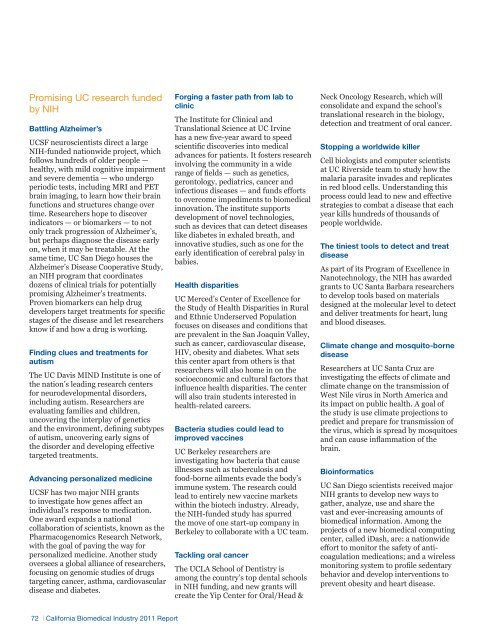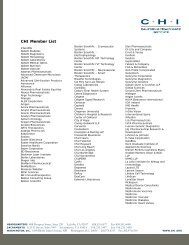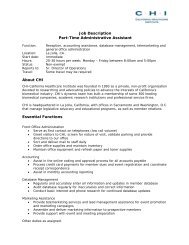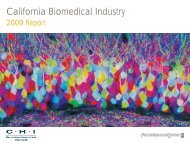California Biomedical Industry - California Healthcare Institute
California Biomedical Industry - California Healthcare Institute
California Biomedical Industry - California Healthcare Institute
You also want an ePaper? Increase the reach of your titles
YUMPU automatically turns print PDFs into web optimized ePapers that Google loves.
Promising UC research fundedby NIHBattling Alzheimer’sUCSF neuroscientists direct a largeNIH-funded nationwide project, whichfollows hundreds of older people —healthy, with mild cognitive impairmentand severe dementia — who undergoperiodic tests, including MRI and PETbrain imaging, to learn how their brainfunctions and structures change overtime. Researchers hope to discoverindicators — or biomarkers — to notonly track progression of Alzheimer’s,but perhaps diagnose the disease earlyon, when it may be treatable. At thesame time, UC San Diego houses theAlzheimer’s Disease Cooperative Study,an NIH program that coordinatesdozens of clinical trials for potentiallypromising Alzheimer’s treatments.Proven biomarkers can help drugdevelopers target treatments for specificstages of the disease and let researchersknow if and how a drug is working.Finding clues and treatments forautismThe UC Davis MIND <strong>Institute</strong> is one ofthe nation’s leading research centersfor neurodevelopmental disorders,including autism. Researchers areevaluating families and children,uncovering the interplay of geneticsand the environment, defining subtypesof autism, uncovering early signs ofthe disorder and developing effectivetargeted treatments.Advancing personalized medicineUCSF has two major NIH grantsto investigate how genes affect anindividual’s response to medication.One award expands a nationalcollaboration of scientists, known as thePharmacogenomics Research Network,with the goal of paving the way forpersonalized medicine. Another studyoversees a global alliance of researchers,focusing on genomic studies of drugstargeting cancer, asthma, cardiovasculardisease and diabetes.Forging a faster path from lab toclinicThe <strong>Institute</strong> for Clinical andTranslational Science at UC Irvinehas a new five-year award to speedscientific discoveries into medicaladvances for patients. It fosters researchinvolving the community in a widerange of fields — such as genetics,gerontology, pediatrics, cancer andinfectious diseases — and funds effortsto overcome impediments to biomedicalinnovation. The institute supportsdevelopment of novel technologies,such as devices that can detect diseaseslike diabetes in exhaled breath, andinnovative studies, such as one for theearly identification of cerebral palsy inbabies.Health disparitiesUC Merced’s Center of Excellence forthe Study of Health Disparities in Ruraland Ethnic Underserved Populationfocuses on diseases and conditions thatare prevalent in the San Joaquin Valley,such as cancer, cardiovascular disease,HIV, obesity and diabetes. What setsthis center apart from others is thatresearchers will also home in on thesocioeconomic and cultural factors thatinfluence health disparities. The centerwill also train students interested inhealth-related careers.Bacteria studies could lead toimproved vaccinesUC Berkeley researchers areinvestigating how bacteria that causeillnesses such as tuberculosis andfood-borne ailments evade the body’simmune system. The research couldlead to entirely new vaccine marketswithin the biotech industry. Already,the NIH-funded study has spurredthe move of one start-up company inBerkeley to collaborate with a UC team.Tackling oral cancerThe UCLA School of Dentistry isamong the country’s top dental schoolsin NIH funding, and new grants willcreate the Yip Center for Oral/Head &Neck Oncology Research, which willconsolidate and expand the school’stranslational research in the biology,detection and treatment of oral cancer.Stopping a worldwide killerCell biologists and computer scientistsat UC Riverside team to study how themalaria parasite invades and replicatesin red blood cells. Understanding thisprocess could lead to new and effectivestrategies to combat a disease that eachyear kills hundreds of thousands ofpeople worldwide.The tiniest tools to detect and treatdiseaseAs part of its Program of Excellence inNanotechnology, the NIH has awardedgrants to UC Santa Barbara researchersto develop tools based on materialsdesigned at the molecular level to detectand deliver treatments for heart, lungand blood diseases.Climate change and mosquito-bornediseaseResearchers at UC Santa Cruz areinvestigating the effects of climate andclimate change on the transmission ofWest Nile virus in North America andits impact on public health. A goal ofthe study is use climate projections topredict and prepare for transmission ofthe virus, which is spread by mosquitoesand can cause inflammation of thebrain.BioinformaticsUC San Diego scientists received majorNIH grants to develop new ways togather, analyze, use and share thevast and ever-increasing amounts ofbiomedical information. Among theprojects of a new biomedical computingcenter, called iDash, are: a nationwideeffort to monitor the safety of anticoagulationmedications; and a wirelessmonitoring system to profile sedentarybehavior and develop interventions toprevent obesity and heart disease.72 | <strong>California</strong> <strong>Biomedical</strong> <strong>Industry</strong> 2011 Report






